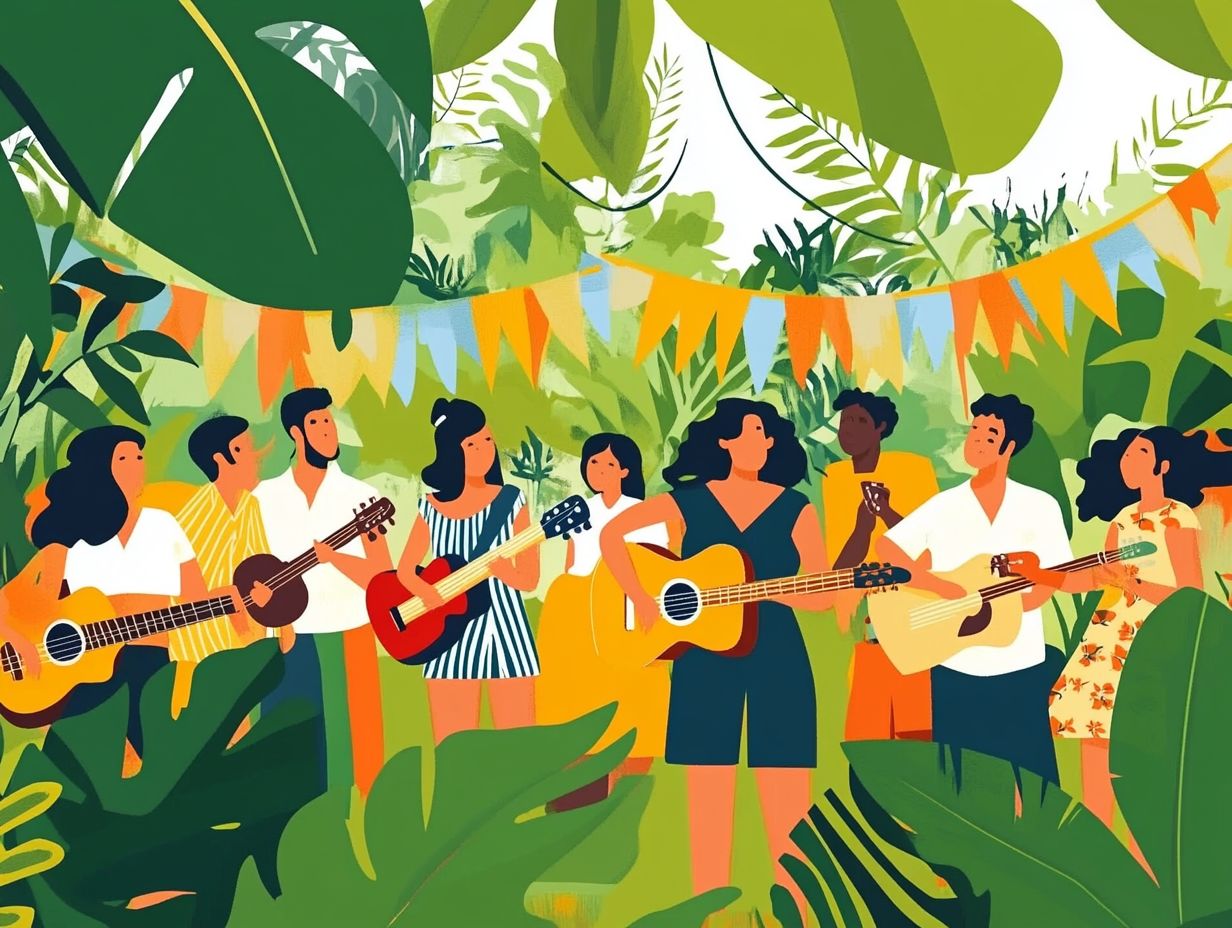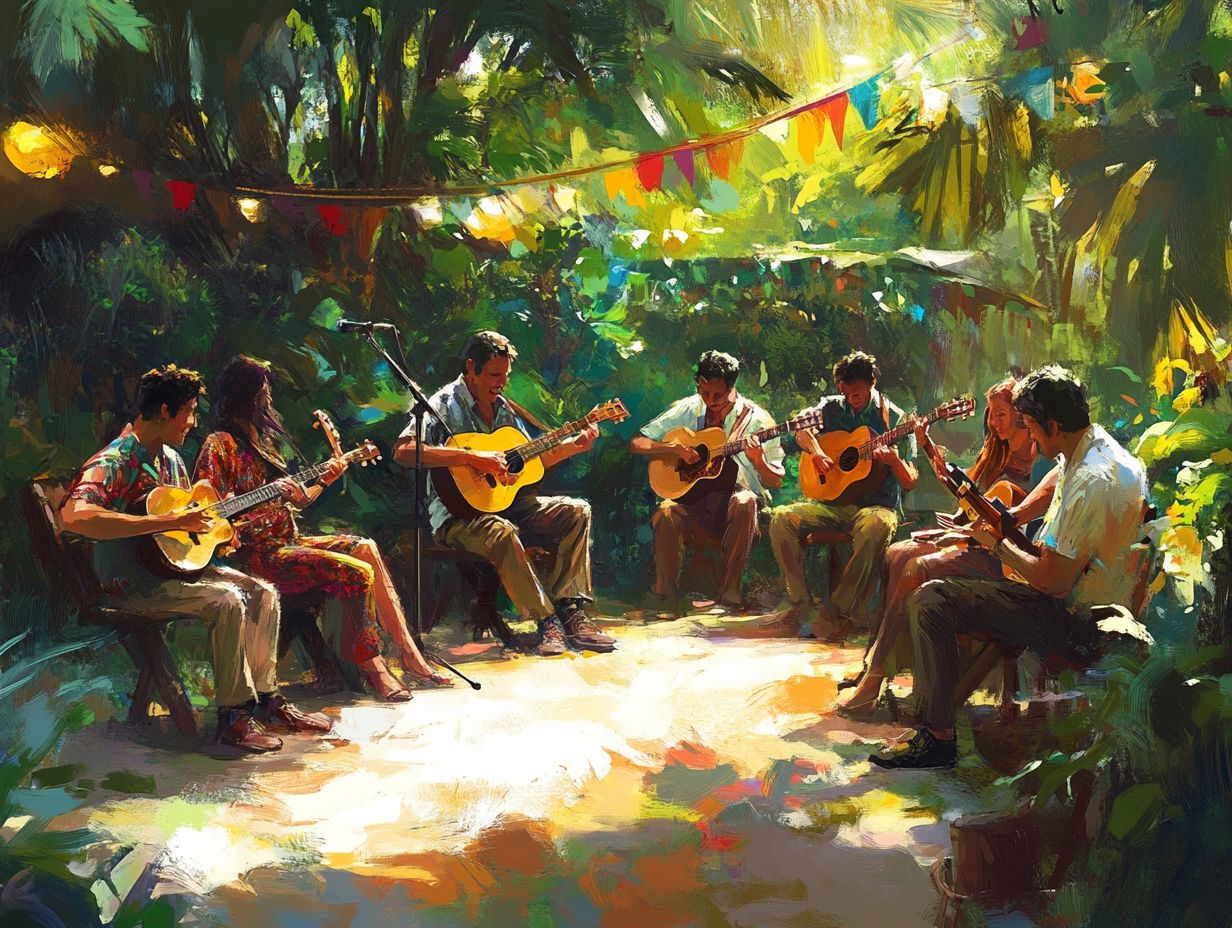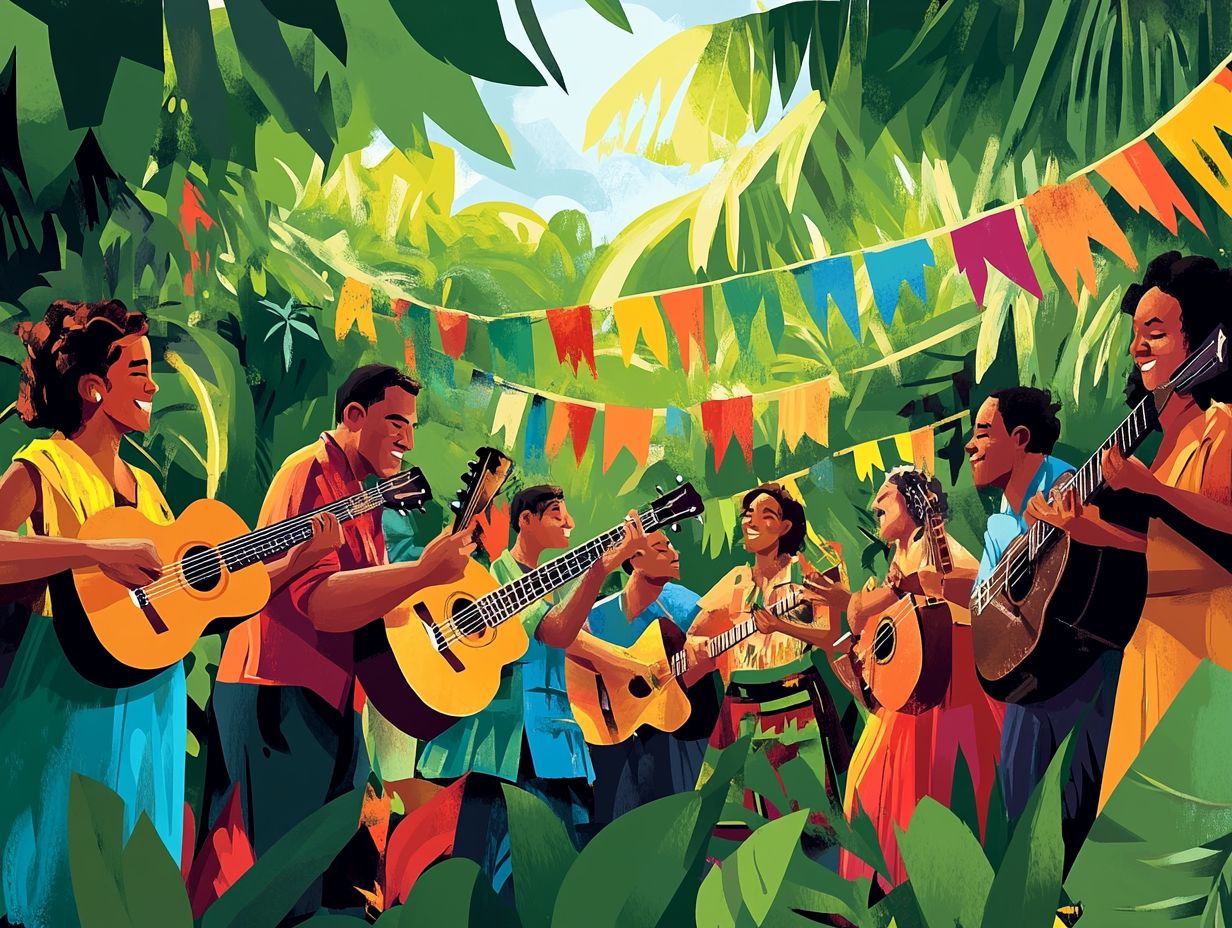The ukulele, a delightful instrument with a rich history, has undergone a fascinating journey from its humble beginnings to becoming a modern-day cultural phenomenon. This article explores the evolution of the ukulele, detailing its decline in popularity and the vibrant resurgence fueled by social media and popular culture.
We will delve into the thriving ukulele community, discuss the numerous benefits of playing, and provide resources for beginners. Additionally, we will examine the future of this beloved instrument, uncovering its potential for continued growth and connection.
Join us as we celebrate the enchanting world of the ukulele!
Contents
The History of the Ukulele

The history of the ukulele, while relatively brief, is quite fascinating. It was created in the 19th century when Portuguese immigrants introduced several string instruments to Hawaii, including the machete, braguinha, and cavaquinho.
From Hawaii, the ukulele made its way to Europe and the United States, where it gained popularity in folk and popular music. Its evolution is closely tied to Hawaiian culture and the Hawaiian musical renaissance, ultimately becoming a staple instrument in Hawaiian music.
The history of the ukulele is characterized by a series of transformations and cultural exchanges, contributing to a rich and vibrant legacy that reflects the beautiful sounds it produces.
Origins and Evolution
The origins of the ukulele can be traced back to the 19th century, where it was influenced by traditional Portuguese string instruments and quickly became a staple of Hawaiian culture. This instrument symbolizes a rich musical heritage and craftsmanship that have evolved over the years.
The ukulele’s journey reflects a fascinating interplay of cultures, merging elements from Portuguese musicians who immigrated to Hawaii with local traditions to create a unique sound that resonates with the spirit of the islands.
As the ukulele transitioned through various musical eras, it became integral to the jazz and folk movements, captivating audiences worldwide. This cultural revival not only rekindled interest in the instrument but also underscored the significance of skilled craftsmanship, as luthiers began to experiment with different woods and designs to enhance its sound.
Today, the ukulele is a beloved tool in music education, inspiring a new generation to embrace its charm and versatility, ensuring that this vibrant musical legacy continues to thrive.
The Ukulele’s Decline in Popularity
The popularity of the ukulele declined significantly in the mid-20th century as musical trends shifted towards rock and pop genres. This change resulted in a decreased interest in traditional instruments and a loss of the cultural exchange that had previously nurtured the ukulele’s growth and appreciation.
Factors Contributing to its Decline

The decline of the ukulele can be attributed to several factors, most notably the rising popularity of pop music and other string instruments that shifted public appreciation away from acoustic performances and traditional folk music, which had previously highlighted the ukulele’s charm.
This transition represented not just a change in musical tastes, but also a transformation in how audiences interacted with sound. As electronic instruments became more widely used, they provided a range and versatility that acoustic instruments could not match.
Their immersive beats and synthesized sounds began to dominate the airwaves, capturing the imaginations of audiences and diminishing the appeal of lighter, folk-inspired music. Additionally, the diversification of world music genres further diluted the ukulele’s audience, as new rhythms and styles attracted young musicians eager to explore global influences rather than the island themes traditionally associated with the ukulele.
These developments were bound to alter the landscape of music appreciation, leaving the charming little instrument at a crossroads.
The Ukulele’s Resurgence
The recent resurgence of the ukulele can be largely attributed to social media, where players showcase their talents, share popular ukulele songs, and connect with communities at music festivals and events.
Influence of Social Media and Popular Culture
Social media has played a crucial role in reigniting interest in learning the ukulele. A multitude of ukulele influencers now offer online lessons, cover contemporary hits, and create entertaining videos that engage viewers and inspire new players to join the thriving community.
Platforms that allow immediate interaction and feedback enable aspiring musicians to quickly learn musical techniques and enhance their creative expression. Viral trends and challenges showcase the ukulele’s versatility, transforming it from a simple hobby into a prominent medium of entertainment.
Short video formats on platforms like TikTok and Instagram highlight the instrument’s accessibility, attracting both professional musicians and beginners eager to develop their own unique sound. Influencers are essential to this evolution, reshaping the narrative around musical enjoyment and inviting a broader audience to experience the joy of playing.
The Ukulele Community

The ukulele community consists of a network of clubs and forums that connect enthusiasts and players. This community fosters a sense of belonging, supports music education, and celebrates the cultural heritage of the ukulele.
Online Communities and In-Person Gatherings
Online communities dedicated to the ukulele have flourished, providing platforms for sharing chord progressions, songs, and techniques. In-person gatherings, such as ukulele workshops and music festivals, offer opportunities for players to connect and celebrate their passion for this expressive instrument.
These platforms not only enable enthusiasts to exchange ideas but also create spaces for improving improvisation skills and enhancing musical creativity. Participation in workshops often leads to personalized guidance from experienced players, helping individuals refine their techniques and explore new musical styles.
Conversely, festivals present the opportunity to witness live performances and engage with fellow players in a vibrant atmosphere, fostering inspiration and camaraderie. Attendees can learn valuable tips and tricks while participating in jam sessions, where they can freely experiment with their sound, unlocking new dimensions of their ukulele journey.
The Benefits of Playing the Ukulele
Playing the ukulele offers numerous benefits, including enhanced physical and mental health. It serves not only as an enjoyable hobby but also as an effective music therapy tool, providing therapeutic advantages for individuals of all ages.
Physical and Mental Health Benefits

Playing the ukulele offers numerous physical benefits, including improved hand-eye coordination and fine motor skills. Additionally, it provides mental health benefits such as stress relief, enhanced cognition, and the joy of learning music in a social environment.
While these advantages are not exclusive to the ukulele, they can be found with most musical instruments. Playing music can also enhance creativity, and music therapy programs aimed at bolstering emotional and psychological health are becoming increasingly prevalent, particularly for young children.
Research indicates that music plays a significant role in the lives of young people by serving as a medium for expression and relaxation. The ukulele, in particular, is often recommended for children who need help in reducing anxiety and improving their mood. Its lightweight design and simple chord structures make it accessible to people of all ages, increasing the likelihood of regular practice.
Consistent practice fosters patience and discipline. Moreover, learning music often occurs in a group setting, which can enhance the sense of belonging and community, further amplifying the positive psychological benefits associated with playing the ukulele.
Learning to Play the Ukulele
Ukulele lessons are easily accessible and manageable for beginners, thanks to the numerous online tutorials, instructional videos, and community resources available. These tools offer essential techniques and support for aspiring musicians.
Resources and Techniques for Beginners
A variety of resources and techniques are available for beginners eager to learn the ukulele. These range from comprehensive online tutorials that cover basic chord progressions to interactive workshops that promote hands-on learning and community engagement.
Exploring different ukulele styles, such as fingerpicking, strumming patterns, or even contemporary pop songs, can ignite a passion for music and enhance the learning experience. Beginners are encouraged to utilize platforms like YouTube for free instructional videos, where experienced players share valuable tips and techniques, making it easier to master the instrument.
Additionally, joining ukulele clubs or online forums can provide essential community support. Practicing regularly in a supportive environment not only builds skills but also fosters friendships and a love for music, significantly enriching the educational journey.
The Future of the Ukulele
The future of the ukulele looks promising, with forecasts suggesting that its popularity will continue to grow. This growth is attributed to the instrument’s ability to adapt to new musical trends, foster musical expression, and encourage community engagement through creative collaborations and educational initiatives.
Predictions and Potential Growth
Predictions for the future of the ukulele indicate significant potential for growth across various music genres, thanks to its versatility and ability to resonate with broad audiences. This not only enhances its cultural heritage but also fosters new musical expressions.
As artists experiment with the instrument’s unique sound, the ukulele is expected to find its place in genres ranging from indie folk to hip-hop. Such collaborations in music may lead to innovative fusions that blend traditional Hawaiian strumming with modern electronic beats or even orchestral arrangements.
The instrument’s easy-going and portable nature could inspire a rise in grassroots movements, encouraging community gatherings and participatory performances. Its enchanting sound suggests that the ukulele will not only influence musical trends but also facilitate cultural dialogues and help bridge generational divides.
